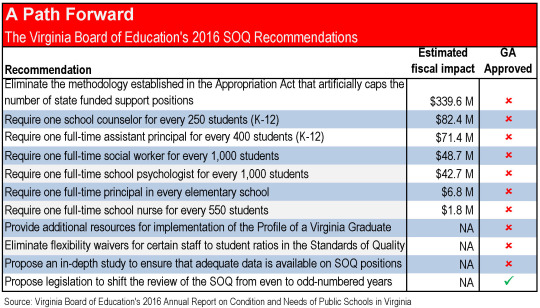March 2, 2017
State Budget Misses On Long-term Solutions for K-12
The 2017 legislative session ended this past Saturday when lawmakers balanced the budget despite a $1.5 billion dollar budget hole. They were able to stave off dramatic cuts to schools and other vital public services, and even included some additional funds for mental health reform and to partially reinstate modest pay increases for state workers and teachers. Yet, one thing absent from the budget deal is a long-term solution for fixing Virginia’s inadequate investment in its public schools.
As pointed out by the Richmond Times Dispatch and Virginian-Pilot, the state made large-scale cuts to K-12 to balance the budget during the financial strain of the recession – equal to $800 million per year. Last year, the state turned the corner and made the biggest new investment in K-12 education since 2009. Yet taking a long-term look, K-12 per pupil support still sits 11 percent below where we were in 2009, inflation adjusted. That’s a difference of $648 for every Virginia student. And that has real impacts in classrooms across the state like fewer instructors, growing class sizes, and deteriorating facilities.
Now that the state is well into an economic recovery, state lawmakers should be looking to find solutions that fix Virginia’s funding problem for the long-term. Instead, they’re depleting the rainy day fund to try and meet commitments made during the last session, and still not completely getting there. State support for the teacher pay raises falls well short of what was initially included in the enacted budget. The state is providing $32 million for its share of a two percent pay increase that doesn’t kick-in until February, 2018, rather than the $134 million to start in July 2017 that was initially promised when the budget was first adopted. The state support for salaries doesn’t even keep pace with inflation.
Virginia’s Board of Education has handed lawmakers a blueprint for restoring support for public education. In November, they unanimously approved common-sense recommendations to undo some of the harmful cuts made during the recession and to ensure Virginia schools have adequate staffing for critical positions such as principals, assistant principals, school counselors, nurses, social workers, psychologists, and other support staff. If the recommendations had been implemented, the state would have largely restored its support for K-12 schools back to pre-recession levels.
Lawmakers failed to address a single one of the recommendations for improving the SOQ from the board that had a fiscal impact. This includes the House voting down a bill to increase support for school nurses, which some schools are now forced to share across buildings.
Neither did lawmakers follow the board’s advice to eliminate an arbitrary cap on the number of support staff the state helps pay for. Lawmakers implemented this cap as a money saving tactic during the recession. The problem is it ignores the actual costs school divisions face. In the first year of the cap, the state cut funding for about 12,900 support positions from the amount recognized before the cap. These positions either had to be fully funded by local governments or eliminated.
Lawmakers even rejected support for an adequacy study to identify the funding required to meet the state’s educational standards.

While lawmakers drag their feet in finding funding solutions, Virginians have shown willingness to do their part to pitch in and better fund schools.
A recent poll conducted by the VCU’s Commonwealth Education Policy Institute (CEPI) shows that a majority of Virginians are willing to pay higher taxes to increase school funding – as the poll has also found the last four years. An even higher percentage of Virginians (67 percent) are willing to pay extra to help low-performing schools.
These polls show the appetite. The proposals from the Board of Education show the path. Now, it’s time for lawmakers to get serious about finding the revenue to adequately support Virginia’s public schools.
Category:
Education
